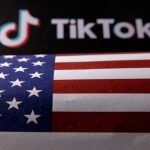
WASHINGTON (Reuters) -President Joe Biden said on Friday he would sign legislation that gives China’s ByteDance about six months to divest the popular TikTok short video app as his rival Donald Trump raised concerns about a ban of the service used by 170 million Americans.
The U.S. House of Representatives plans to vote on Tuesday or Wednesday of next week on the TikTok crackdown bill after a committee on Thursday unanimously approved the measure. The House will vote on the proposal under rules requiring two-thirds of members to vote “yes” to win approval.
“If they pass it, I’ll sign it,” Biden, a Democrat, told reporters. The bill faces an uncertain outcome in the Senate, where some lawmakers say they want changes to the legislation.
Republican Trump, who is seeking a return to the White House in the November election, expressed objections to banning TikTok, saying on social media: “If you get rid of TikTok, Facebook … will double their business,” and added he does not want Facebook “doing better.”
Trump previously criticized Facebook parent Meta Platforms (NASDAQ:META) for revoking his access to Facebook and Instagram after removing two of his posts during the Jan. 6, 2021, U.S. Capitol riot. His accounts were reinstated in February 2023.
The Trump campaign did not immediately comment on whether he has a position on the legislation. Meta Platforms declined to comment.
The Justice Department told the House Committee on Energy and Commerce that a divestiture bill, rather than a bill banning TikTok, would put the government in a stronger legal position, according to a document seen by Reuters.
Mike Pence, who served as vice president under Trump, endorsed the proposed House legislation on TikTok. “China is poisoning the minds of American children. Enough is enough,” he wrote on social media site X, formerly known as Twitter.
The bill would give ByteDance 165 days to divest TikTok. If it failed to do so, app stores operated by Apple (NASDAQ:AAPL), Alphabet (NASDAQ:GOOGL)’s Google and others could not legally offer TikTok or provide Web hosting services to ByteDance-controlled applications.
In 2020, Trump sought to ban TikTok and Chinese-owned WeChat but was blocked by the courts.
Republican Senator Rand Paul, who previously blocked attempts to fast-track a TikTok ban, responded to Trump’s statement that said the former president helped address concerns about U.S. users of TikTok through a $1.5 billion company project.
“So why is the House GOP siding with Biden and still trying to ban Tik Tok?” Paul wrote on X, using an acronym for Republicans. “If Congress bans TikTok, they will be acting just like the Chinese communists who have also banned TikTok … Why not just defend the first amendment?”
Trump said in an August 2020 executive order that TikTok data collection “threatens to allow the Chinese Communist Party access to Americans’ personal and proprietary information — potentially allowing China to track the locations of Federal employees and contractors, build dossiers of personal information for blackmail, and conduct corporate espionage.”
TikTok, which says it has not and would not share U.S. user data with the Chinese government, argues the House bill amounts to a ban. It is unclear if China would approve any sale or if TikTok it could be divested in six months.
“This legislation has a predetermined outcome: a total ban of TikTok in the United States,” the company said after the House Energy and Commerce Committee vote. “The government is attempting to strip 170 million Americans of their Constitutional right to free expression.”
The app is popular and getting legislation approved by both the House and Senate in an election year may be difficult. Last month, Biden’s re-election campaign joined TikTok.
Trump’s campaign has not joined TikTok.
To read the full article, Click Here

